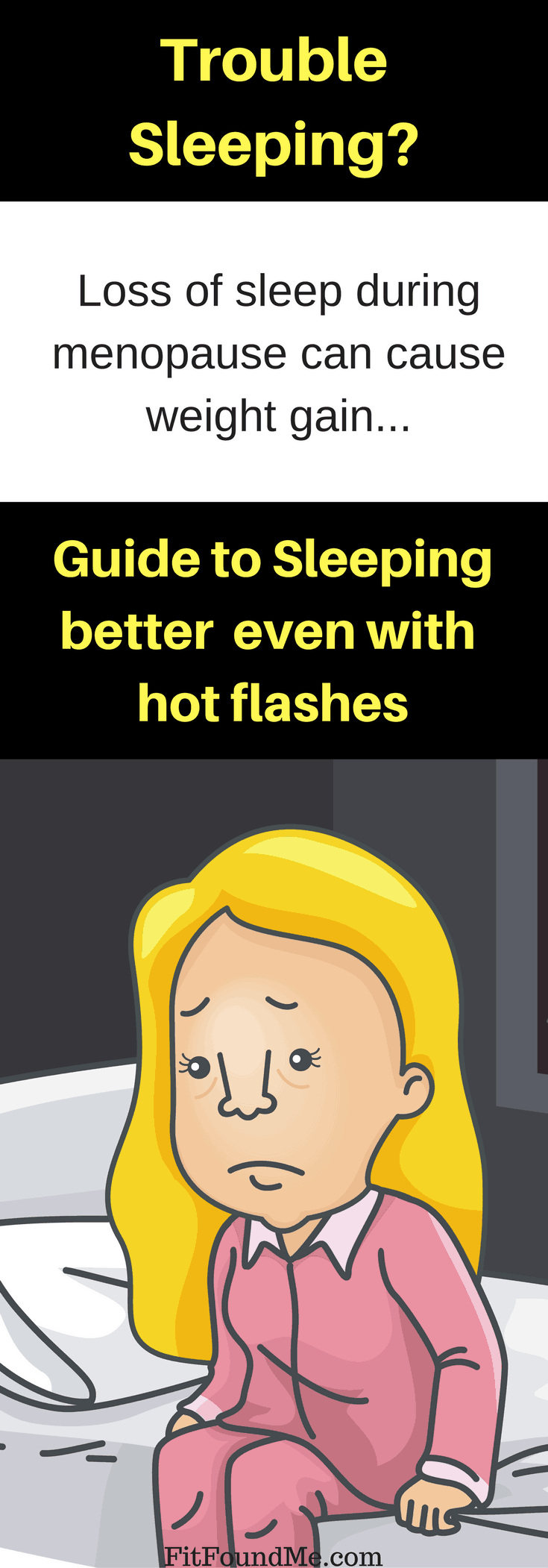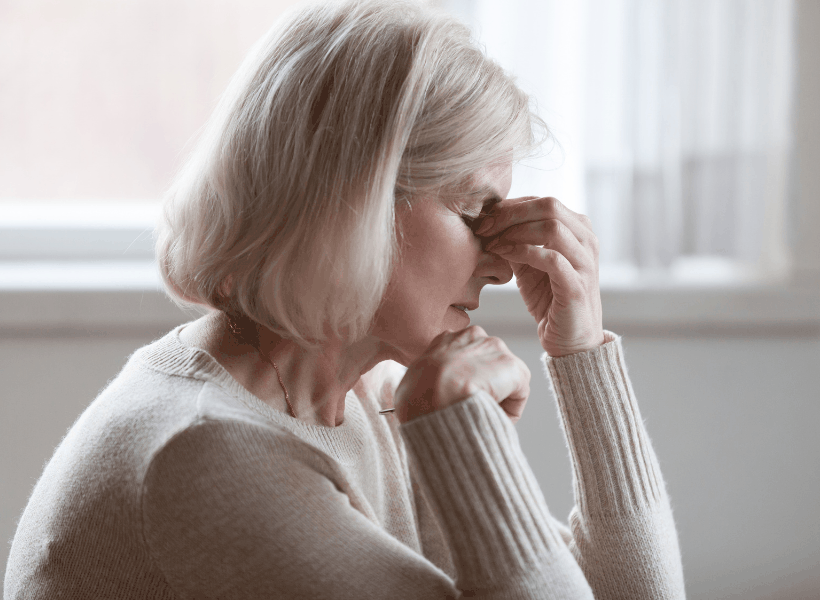Sleep loss causing weight gain during menopause is more common than you may realize. Whether you’re in peri-menopause, menopause or post-menopause, you might be experiencing trouble falling asleep or even staying asleep contributing to sleep loss causing weight gain due to a hormonal imbalance.

How Much Sleep is Required?
Since I started sleeping in my Fitbit my sleep patterns have been recorded and monitored in detail. I have realized when I get about 6-7 hours of sleep per night, I do feel much better than the nights I get less than 6.
Though there is no way to tell exactly how much sleep is required for each individual, studies have pinpointed a range of sleep for better overall health and wellness. Studies have shown adults ages 18-64 need 7-9 hours per night for good health. (source)
“We used to think you needed a significant amount of sleep deprivation for it to have an effect on weight. It turns out that’s not true,” says Michael Breus, PhD, a sleep specialist and author of The Sleep Doctor’s Diet Plan: Lose Weight Through Better Sleep. Just a mere 30 minutes less sleep can contribute to weight gain.
Just a mere 30 minutes less sleep can contribute to weight gain.
Sleep Patterns for Peri-Menopause, Menopause and Post-Menopausal Women
Sleep for women who are experiencing various degrees of menopause can be a real problem. Studies have shown many women wake up feeling not rested more than 4 days of the week and get an average of fewer than 7 hours of sleep per night. (source)
I know what you’re thinking, even 6 hours would be nice to get, 7 hours would be a luxury and not even possible. There are many nights when I get less than 6 hours of sleep. Those are the days when I am dragging.
So, how do we get at least 7 hours of sleep every night?
Other Health Dangers for Sleep Deprivation
Not only does sleep loss causing weight gain pose a problem, but there are other health concerns to worry about. Sleep loss isn’t just an inconvenience, your lack of sleep can be causing weight gain, cardiovascular disease, and diabetes.
“Sleep is important for pretty much every one of your physical systems,” says Janet K. Kennedy, PhD, a clinical psychologist and founder of NYC Sleep Doctor. “Sleep deprivation leads to deficits in cognitive functioning, whether it’s reaction time, decision-making, or memory.”
When we aren’t getting adequate sleep, 7-9 hours per night, our cortisol levels rise and are believed to cause a higher level of cravings and willpower to be reduced.
You know as well as I do when we don’t feel rested it’s even that much harder to exercise that day. It becomes a cycle that’s hard to break.
How is Sleep Loss Causing Weight Gain?
Often when women are sleep deprived they tend to reach for unhealthier foods, especially that candy bar while standing in the checkout aisle to get a sugar pick-me-up in the afternoon.
That urge to grab the candy bar is more than meets the eye though. The stress hormone, cortisol is higher than normal due to the sleep deprivation. Higher than normal cortisol levels trigger a series of hormonal changes that can increase your appetite, therefore causing you to eat more than your daily calorie requirement. (source)
While there are many studies that prove sleep deprivation has an effect on overeating, the lack of energy to exercise cannot be ignored as another factor in sleep loss causing weight gain.
Sleep loss causing weight gain is the foundation for many aspects of living a healthy life. Not only will it have a physical effect on your body, but as we already know, it takes a mental toll as well.
Follow some of the tips below to ensure you are getting the sleep your body needs.
Preventing Sleep Loss Causing Weight Gain
1- Plan for Success
Calculate sleep for 8 hours from the time you need to wake up. Because there is some awake time from the time you are in bed, allow for that by getting in bed 8 hours instead of right at 7 hours. It could take you about 30 min to fall asleep, and perhaps one bathroom break during the night. Once you have established times, stay consistent.
It may be a little difficult to make it to bed as early as needed to start with, but create an evening schedule that works.
2 – Keep room temperatures cool
Whatever menopause cycle you’re in, chances are you will be experiencing hot flashes through the night. Keeping the room cool enough will minimize the effects and should help you fall asleep faster after a hot flash occurs.
3 – Talk to your Doctor about HRT – Hormone Replacement Therapy
Hormone Replacement Therapy plays an important role in some women to help increase quality of life through the menopause symptoms. While it is considered to be high risk for certain medical conditions such as blood clots, breast cancer and stroke not all women are at risk. Talk to your doctor for details and guidance.
Since having my hysterectomy, I have been on Vivelle patches to replace hormones. While I have had some symptoms while correcting doses and medications, menopause symptoms have been minimal. I have read some doctors shy away from prescribing, however, I have spoken to many doctors in the past years about mine and there aren’t any long term negative effects for me. Perhaps the negative effects are due to isolated other factors that could make someone else a high-risk. It should be a case by case basis and a conversation with your doctor.
Rebeckah Wang-Cheng, author of Menopause, suggests using an antidepressant Effexor for women reluctant to take an estrogen supplement to reduce hot flashes that can disrupt sleep.
3 – Exercise regularly
Exercise daily, however, you may want to avoid exercising in the evenings.
4 – Avoid caffeine in the late afternoons and evenings
Of course, this is somewhat common sense, but we may not realize or think before drinking a soda, tea or coffee after dinner about the caffeine.
5 – Melatonin
A natural supplement for sleeping, this can help you get to sleep and stay asleep through the night. I like it because on the occasion I take it, I don’t wake up groggy the next morning.
6 – Mattress Choice
It wasn’t until I was about 40 years old that we got a mattress I LOVED. After laying on more mattresses than I can count, we decided to take the plunge and get a Tempur-pedic mattress. If you aren’t sleeping well, your mattress may need a closer look.
Sleep loss can definitely be contributing to weight gain after 40. It’s important for us to not only rely on how we feel (we could be used to only getting 5 hours of sleep), but trust in the research and give 7-9 hours a sleep a try to see if that can make a difference in how we feel and the weight we lose after age 40.
What helps you get the most ZZZZZs? Share your tips by commenting below.




Tandy Deerdoff
Monday 13th of August 2018
Sleep loss is a big problem for me because I work 12 hour rotating shift work, which means I swap back and forth from days to nights, and there are a few shifts during the month I only have 1 day in between shift swaps..example: I work 3 12 hour days (Fri, sat, sunday) have Monday off and swap to nights on tues wed thurs... I believe this is one reason for my recent (in the last 2 years) weight gain. I am 45 years old, have 6 kids (4 that's are over 18, though they don't act like it very often) and raising my 5 year old grandson.. my husband has chronic back/shoulder pain(surgeries etc) so he is limited on the help he can give me.. I completely exhausted most days... I'm just always praying God gives me strenght and endurance to make it another day... I feel like there's not much I can do about my sleep because of my job so it's pretty discouraging... I thought maybe I had thyroid probs because of how I feel but of course all my blood work was perfect ? wish I had a solution
Stephanie Miller
Saturday 25th of August 2018
Hi Tandy,
Wow, you have your plate full. The rotating shift work has to be really hard on you. If I were you, I wouldn't stress too much about not being able to exercise daily right now. Try to keep nutrition on point, and a nice walk a couple of times a week could be very beneficial for you.
Hang in there!